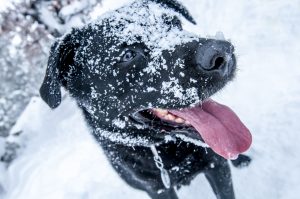Baby It’s Cold Outside: Winter Pet Safety
 Winter isn’t here just yet, but many of us have already begun thinking about our cold weather preparations. You may have started digging out your coats and sweaters, beginning the process of winterizing your home, yard, and car, and perhaps even entering the planning stages for holiday and winter celebrations and get-togethers.
Winter isn’t here just yet, but many of us have already begun thinking about our cold weather preparations. You may have started digging out your coats and sweaters, beginning the process of winterizing your home, yard, and car, and perhaps even entering the planning stages for holiday and winter celebrations and get-togethers.
This slow transition to cold weather is the perfect time to consider winter pet safety. Keeping pets protected during the icy months is vital to their safety, comfort, and overall health.
Winter Pet Safety: Protection from the Elements
Winter weather is no laughing matter here in Colorado, and the safest and most comfortable place for your pet is indoors with you. Keep the following points in mind for those times when pets are outdoors:
- Know your pet’s tolerance for cold weather, as it can vary widely by breed, age, and level of health.
- Pets in general, regardless of the breed or size, should not be left outdoors in the cold winter months.
- It is a myth that just because pets have hair coats, they are naturally warmer when outdoors in the cold. Any pet can have trouble dealing with cold weather, regardless of how much hair they have.
- There are a few heavy-coated, larger breed dogs that are able to tolerate being out in the cold, but they are still susceptible to all of the risks cold weather brings.
- As with humans, pets can get frostbite and hypothermia. And, because their foot pads are exposed, they are especially vulnerable to cracking and bleeding, as well as slipping on snow and ice.
- For a dog that tolerates cold weather well and prefers being outdoors, such as a husky or malamute, be sure to provide a warm, comfortable shelter that will provide protection from the elements.
- Make sure that your pet has access to fresh, unfrozen water while outdoors.
- Always bring your pet indoors when temperatures drop below freezing (32 degrees fahrenheit), regardless of the breed.
- A protective coat or sweater can provide additional protection from the cold when outdoors for walks and potty breaks. Shorthaired breeds, as well as very young or old pets, may need extra layers to keep warm.
- Use protective snow booties to keep your pet’s feet warm and dry. They come in various types and sizes.
- Rock salts and deicers are toxic and irritating for your pet’s skin and paws, so be sure to wash or wipe your pet’s paws and belly after walks. This is another reason to provide a protective coat or sweater and booties.
Antifreeze and Pets
Each year, thousands of pets die due to antifreeze poisoning. Antifreeze contains ethylene glycol, a dangerous and potent toxin to pets. Its sweet odor and taste make it irresistible to many pets, but even a small amount can cause kidney failure if ingested.
Pets are more likely to be exposed to antifreeze in the winter than in the warmer months, so practicing safety in this area is a must. Keep your pets safe from antifreeze this winter by:
- Supervising pets at all times while outdoors
- Cleaning up antifreeze spills immediately
- Storing unused antifreeze out of your pet’s reach
- Switching to a pet-friendly brand of antifreeze
If you suspect that your pet has ingested antifreeze, seek medical attention for him or her immediately. Prompt treatment will greatly increase your pet’s chance of survival.
Watch that Winter Weight
The cold weather and holiday festivities can mean missed walks and playtime for our four-legged friends, leading to winter weight gain and its associated health concerns. Make a commitment to keeping your pet in tip-top shape this winter with the following ideas for winter exercise:
- Don’t let the cold and snow slow you down. Get out there and walk or play with your dog anyway!
- Play indoor games such as, “hide-and-seek” and “tug-o-war”, or hide a favorite toy or treat in another room and play “find it”.
- Obedience training, agility classes, and obstacle courses provide exercise and mental stimulation for dogs of all ages and abilities.
- Provide exercise and interest for indoor cats with the use of cat trees, laser pointer or feather chase games, or even a wadded up newspaper or an empty box.
Questions or concerns about winter pet safety? Don’t hesitate to contact the team at Lone Tree Veterinary Medical Center.

